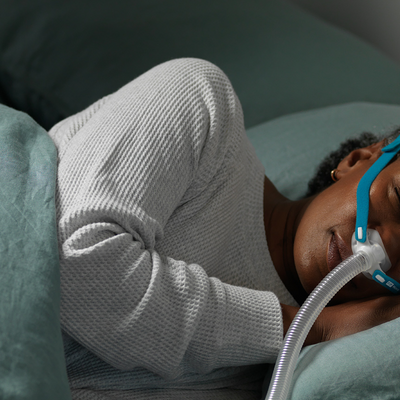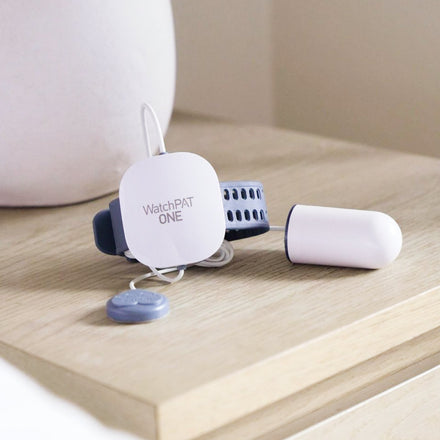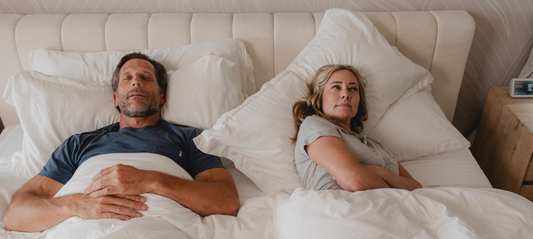Whether you have or suspect you have sleep apnea, you’re here because you want to find out the many CPAP benefits that improve your overall health.
So let’s keep the answer simple: The No. 1 benefit of CPAP is that it treats sleep apnea. And when you treat sleep apnea, you reduce your risk of obesity, diabetes, heart disease, and accidents. You can also recover the mental clarity, intimate relationships, and emotional health that are destroyed by poor and inconsistent sleep.
Of course, there are more technical details that describe the connection between quality of life and CPAP therapy. To unpack the advantages of using CPAP machines, let’s first review how sleep apnea disrupts your sleep — and second, how CPAP can treat it.
The Dangers of Untreated Sleep Apnea
Sleep is the cornerstone of healthy living. Because sleep apnea disrupts your sleep, it negatively impacts so many aspects of your short- and long-term health.
Therefore, the risks of untreated sleep apnea are significant. While sleep apnea on its own is rarely a cause of death, it can lead to or worsen health complications if left untreated.
Sleep apnea (also called OSA) that goes untreated can lead to weight gain and obesity. It can increase your likelihood of developing diabetes; and if you already have diabetes, sleep apnea can worsen the effects and management of the chronic condition.
Untreated OSA also increases your risk of depression, hypertension, and cardiovascular conditions such as stroke, heart disease, and heart failure.
And then there’s the day-to-day disruptions that untreated sleep apnea can trigger. Motor function, memory, and ability to concentrate are all hindered by OSA, which makes you tired, groggy, irritable, and prone to accidents. Simply put, sleep apnea is hazardous to your health.
But here’s the very hopeful outcome of OSA: If you regularly use your CPAP machine to treat your condition, you can add years to your life.
With CPAP therapy, you can reduce the risk of long-term health conditions such as obesity, diabetes, heart disease, and depression. You can also improve your cognitive function, memory, quality of sleep (read: no more snoring!), relationships (because no more snoring!), and emotional well-being.
The Benefits of CPAP Therapy
Longer, more restorative sleep is an obvious CPAP therapy benefit. But the most pressing reasons to start CPAP therapy are three-fold: (1) to treat your sleep apnea, (2) to reduce your risk of harmful health outcomes, and (3) to improve your quality of life.
How Does CPAP Help You Sleep Better?
CPAP therapy describes the treatment for OSA through consistent, nightly use of a CPAP machine. Its purpose is to open your airway so that you consistently and fully breathe in the oxygen that would otherwise be obstructed by your sleep apnea.
The CPAP motor first generates a stream of pressurized air that passes through the tube and into your mask. Then, as the pressurized air moves from your mask to your upper airways, its force prevents your throat from narrowing or collapsing. The result: uninterrupted, restorative sleep.
Does CPAP Really Make a Difference?
The short answer is yes.
While there is no medical cure for sleep apnea, CPAP therapy can greatly reduce the symptoms and health impacts of the condition. It can also significantly improve your quality of life. Here’s a rundown of the many benefits of using a CPAP machine:
- longer life span
- improved cardiovascular health
- decreased risk of heart disease and stroke
- increased energy levels
- reduced risk of weight gain and obesity
- improved weight-loss management
- reduced risk of diabetes
- reduced daytime sleepiness, brain fog, and irritability
- decreased onset and severity and of morning headaches
- improved concentration, focus, and problem-solving skills
- improved memory
- increased daytime productivity
- increased sleep time and quality (for you and your bed partner!)
- eliminated or greatly reduce snoring, gasping, and dry mouth
- improved relationships
- reduced risk of workplace and motor vehicle accidents
Do You Have to Use CPAP Every Night?
As with anything, consistency is key. If you have sleep apnea, you should use your CPAP every night. The more regularly you use your CPAP device, the more likely you are to curb the harmful effects of sleep apnea.
In fact, one study concluded that if you keep using your CPAP machine for more than 10-15 years, you have a 62% lower risk of “all-cause” mortality than people who leave their OSA untreated. Better sleep, a better waking life, and a lower likelihood of death — these are all profound arguments for using consistent CPAP therapy to manage your sleep apnea.
What Can You Do If You Have Sleep Apnea?
First, if you suspect you have sleep apnea, take a sleep quiz. The majority of people living with OSA — 70%, to be exact — don’t even know they have it! So the first step to treating sleep apnea is to get diagnosed.
Second, if you already know you have sleep apnea, take a home sleep test with Lofta. A sleep coach will walk you through your CPAP options so you can find a machine that suits your sleep needs.
CPAP Benefits Your Overall Health
Consistent, high-quality sleep is fundamental to your mental, emotional, and physical health. When you sleep well, you can maintain the energy, focus, and motivation you need to manage your daily life and long-term well-being.
And if you have sleep apnea, CPAP therapy helps you get the quality sleep you’ve been missing. Get a home test today, and get on your way to a restful night’s sleep!













































